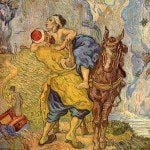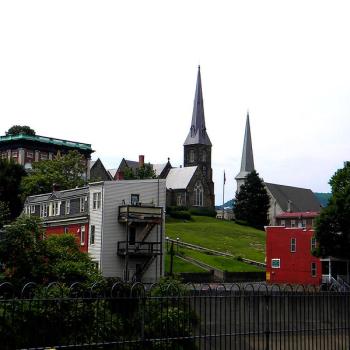This sermon is part of the Patheos 2021 Easter season sermon series. See all sermons here.
“The true division of humanity,” Victor Hugo wrote in Les Miserables, “is between those who live in light and those who live in darkness.” Victor Hugo, it seemed, understood Easter.
We love to think of Easter as the feast of dazzling light. We get up on Easter Sunday morning knowing that the sorrow of Good Friday is finally ended, that the pain of the cross has been compensated for by a burst of brilliant victory from the gates of the grave, that Jesus is vindicated, that the faith of the disciples is confirmed for all to see, and that everyone lived happily ever after. We love fairy tales. Unfortunately Easter is not one of them.
On the contrary, Easter is raw reality. Easter stands in stark witness, not to the meaning of death, but to the meaning of what it is to go on despite death, in the face of death–because of death. To celebrate Easter means to stand in the light of the empty tomb and decide what to do next. Until we come to realize that, we stand to misread the meaning not simply of the Easter gospel but of our own lives. We miss the point. We make Easter an historical event rather than a life-changing commitment. We fail to realize that Easter demands as much of us now as it did of the apostles then.
To say, “I believe in Jesus Christ…who rose from the dead,” then, is to say I believe that the Resurrection goes on and on and on forever. Every time Jesus rises in our own hearts in new ways, the Resurrection happens again. Every time we see Jesus where we did not recognize him before–in the faces of the poor, in the love of the unloved, in the revelatory moments of life, Jesus rises anew.
To say, “I believe in Jesus Christ…who rose from the dead,” is to say something about myself at the same time. It says that I myself am ready to be transformed. Once the Christ-life rises in me, I rise to new life as well. “Christ is risen; we are risen,” we sing at Easter. But it has a great deal more to do with life than with death. If I know that Jesus has been transformed, then I am transformed myself and, as a result, everything around me.
Until we find ourselves with new hearts, more penetrating insights, fewer compulsions, less need for the transient, greater awareness of the spiritual pulse of life, resurrection has not really happened for us. Jesus has risen but we have not. Resurrection is change at the root of the soul. It marks a whole new way of being in life.
That’s what Easter is really about. It is the “division of humanity” to which Hugo refers in his great dramatic rendering of the struggle between light and dark. The message to us is a clear one. When we follow Jesus, the path is often through darkness to what looks to the world–to us–like failure and defeat. But when we ourselves carry the message of Jesus–when we live the life of Jesus here and now, when we, too, confront the world around us with the blessedness of those poor, those outcast, those foreigners, those women, those voiceless for whom Jesus gave his life–we carry within ourselves the promise of new life. We live the ongoing message of the Resurrection itself: What comes in the name of Jesus will not die. The darkness will not be overcome as long as we ourselves never blow out the light of Truth in our own hearts.
“Only that day dawns,” Thoreau teaches, “to which we are awake.” Yes, Easter is about dazzling light–but only if it shines through us.
For Patheos 2021
Forthcoming In: In the Light of the Messengers: Lenten reflections by Joan Chittister, OSB
ed. Mary Lou Kownacki, OSB,
Benetvision (joanchittister.org)
Joan Chittister, OSB, a member of the Benedictine Sisters of Erie, PA, is an international speaker and the author of over 50 books. She speaks and writes on issues of peace, justice and equality, especially for women in both church and society. You can find her at joanchittister.org
4/5/2021 5:21:54 PM




